Discover Why Whole Foods Outshine Dietary Supplements in Nutritional Value
Whole foods deliver an extraordinary mix of nutrients that significantly surpass the benefits of isolated dietary supplements. Unlike pills or powders, whole foods are available in their natural and complete forms, supplying a rich array of vitamins, minerals, fiber, water, enzymes, and bioactive compounds that work together harmoniously to support your body’s requirements. This intricate nutritional complexity is almost impossible to duplicate in laboratory settings. Whole foods serve not merely as sources of nutrition but as comprehensive solutions for maintaining optimal health and well-being.
If you prefer to listen, click below:
In our fast-paced society where convenience often takes precedence, the allure of quick options like capsules and fortified bars can be quite strong. Nonetheless, while dietary supplements can be helpful in addressing nutrient deficiencies, they frequently lack the balance, co-factors, and natural synergy that whole foods provide. Nature has designed these nutrients in ways that our bodies can effectively recognize, absorb, and utilize, aligning seamlessly with our evolutionary requirements.
Whole foods nourish us on multiple levels, presenting a diverse array of nutrient profiles that enhance immunity, increase energy, and promote long-term health. Their superior absorption rates guarantee that your body extracts maximum benefits from each bite. Moreover, the protective properties of whole foods, including antioxidants and anti-inflammatory compounds, assist in shielding against chronic diseases, thereby enhancing overall wellness and vitality.
From farm to table, whole foods deliver unmatched nourishment and vitality. They function not only as sources of fuel but also as the very cornerstone necessary for achieving wellness, longevity, and an energetic life.
Understanding the Exceptional Nutrient Density of Whole Foods
Whole foods, including fruits, vegetables, grains, legumes, and nuts, are packed with essential vitamins, minerals, and phytonutrients. These components are crucial for overall survival, acting as dynamic tools that foster vibrant health. For example, kale is rich in vitamin K, which plays a vital role in blood clotting, vitamin C that strengthens immunity, and a host of antioxidants designed to protect your cells from oxidative damage—all available in just one serving.
A major advantage of whole foods is their rich supply of phytonutrients. These natural compounds, found solely in plants, encompass flavonoids, carotenoids, and polyphenols. Phytonutrients protect plants from threats like pests, UV radiation, and diseases. When we consume these foods, we inherit these protective benefits, which assist in detoxification, reduce inflammation, enhance immunity, and may potentially slow the aging process.
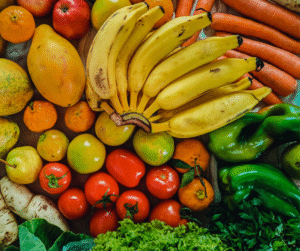 While phytonutrients are not classified as essential for survival, they are vital for achieving optimal health. The lack of these compounds in supplements represents a significant limitation. A supplement might offer vitamin C, but it cannot replicate the hundreds of flavonoids naturally found in a single piece of fruit, which enhance its overall effectiveness.
While phytonutrients are not classified as essential for survival, they are vital for achieving optimal health. The lack of these compounds in supplements represents a significant limitation. A supplement might offer vitamin C, but it cannot replicate the hundreds of flavonoids naturally found in a single piece of fruit, which enhance its overall effectiveness.
Scientific studies consistently show that diets abundant in whole foods significantly lower the risk of chronic diseases. A whole-food-focused diet enhances cardiovascular health, mitigates inflammation, and bolsters immune function. Populations that consume diverse, plant-based diets typically enjoy longer lifespans, experiencing lower rates of obesity, diabetes, and cancer.
This is not merely a passing trend; it represents a proven pathway to achieving long-term health. By opting for whole foods, you are choosing a nutrient-rich, life-sustaining diet that nourishes every cell in your body, providing precisely what it needs to thrive.
Unlocking the Secrets of Nutrient Absorption and Bioavailability
Bioavailability refers to the degree to which your body can absorb and utilize the nutrients consumed. Whole foods provide these nutrients in their most accessible and usable forms. They also contain co-nutrients like enzymes, fiber, and healthy fats that significantly enhance nutrient uptake.
For instance, the vitamin C found in oranges assists your body in absorbing more iron from spinach. This type of nutrient cooperation is immensely beneficial for overall health. The healthy fats present in avocados improve the absorption of fat-soluble vitamins such as A, D, E, and K. Similarly, combining turmeric with black pepper enhances the absorption of curcumin, the primary active compound in turmeric, amplifying its health benefits.
These advantageous combinations naturally occur in whole foods or traditional meals, ensuring that your body effectively utilizes the nutrients. In contrast, supplements frequently isolate nutrients, stripping away these natural facilitators. Without co-factors, nutrient absorption can significantly decline.
Some nutrients require specific forms or conditions for optimal absorption. For example, calcium needs vitamin D for proper absorption. Whole foods often provide both nutrients together, while supplements may offer one without the other, reducing efficacy.
Research indicates that nutrients sourced from whole foods are absorbed more efficiently than their synthetic counterparts. Your body recognizes them as real food. By maintaining a colorful, varied diet, you maximize nutrient absorption while minimizing waste. You nourish your body with precisely what it needs in a form it can utilize effectively.
Exploring the Incredible Benefits of Nutrient Synergy in Whole Foods
Whole foods feature nutrients that inherently complement one another, enhancing overall health. This natural synergy amplifies their effectiveness and promotes better health outcomes. For example, pairing tomatoes with olive oil increases the absorption of lycopene, a powerful antioxidant linked to heart health and cancer prevention.
Cooking tomatoes can further enhance lycopene bioavailability. The heat helps break down cellular walls, making it easier for the body to absorb this essential nutrient. This scenario is a rare instance where cooking actually amplifies a food’s nutritional impact.
Other beneficial combinations include pairing leafy greens with citrus fruits to boost iron absorption or consuming salmon alongside leafy greens to combine omega-3s and magnesium. These smart combinations improve nutrient function, bolster immunity, and assist in disease prevention.
In contrast, supplements often lack this inherent synergy. Nutrients are frequently isolated and stripped of their natural co-factors. They are often subjected to harmful conditions, such as light, moisture, heat, or air during production or storage, which can diminish their efficacy even before they reach your body.
Whole foods, however, protect delicate nutrients through their natural structures. These nutrients remain stable and intact until digestion begins, making real food a more reliable, effective, and beneficial choice overall.
Nature does not deliver nutrients one at a time. Instead, it offers them in thoughtfully designed packages that your body can comprehend and utilize efficiently. This is why a diet rich in whole foods better supports energy, longevity, and overall health compared to isolated supplements.
Understanding the Vital Role of Dietary Fiber in Promoting Digestive Health
Fiber is an essential element found in whole foods, playing a crucial role in supporting digestive health and overall well-being. Whole foods naturally contain both soluble and insoluble fiber. Soluble fiber dissolves in water, aiding in blood sugar regulation and cholesterol management, while insoluble fiber adds bulk to stool and encourages regular bowel movements, preventing constipation.
Moreover, fiber serves as nourishment for beneficial gut bacteria. These bacteria ferment fiber into short-chain fatty acids, which help mitigate inflammation and strengthen the gut lining. A healthy gut microbiome is vital for a robust immune system and influences various factors, including mood and metabolism, thereby contributing to overall health.
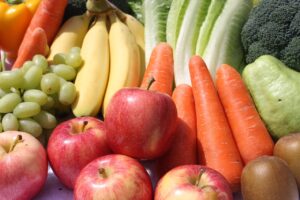 While prebiotic supplements aim to nourish gut bacteria, they typically contain only one or two fiber types. In contrast, fibrous vegetables, whole grains, legumes, nuts, and seeds provide a diverse range of prebiotic fibers. This variety is essential for maintaining a healthy and balanced microbiome, which is crucial for optimal health.
While prebiotic supplements aim to nourish gut bacteria, they typically contain only one or two fiber types. In contrast, fibrous vegetables, whole grains, legumes, nuts, and seeds provide a diverse range of prebiotic fibers. This variety is essential for maintaining a healthy and balanced microbiome, which is crucial for optimal health.
Foods high in fiber include oats, lentils, chickpeas, carrots, apples, broccoli, and flaxseeds. Including these foods in your daily diet supports digestion, lowers cholesterol levels, balances blood sugar, and helps regulate appetite. Fiber slows digestion, allowing you to feel fuller for longer, and promotes healthy weight management, which is fundamental for long-term health.
Whole foods deliver fiber as part of a comprehensive package—complete with vitamins, minerals, water, and enzymes—making them far more effective than fiber supplements alone. Unlike ultra-processed alternatives, they contain no additives or synthetic fillers, ensuring pure nourishment.
In summary, dietary fiber sourced from whole foods does far more than just maintain regularity. It contributes to building a resilient gut, a robust immune system, and a healthier body from the inside out, enhancing overall well-being.
The Superior Antioxidant Properties of Whole Foods Explained
Antioxidants are natural compounds that protect your cells from oxidative stress and damage caused by free radicals. This damage significantly contributes to aging, inflammation, and chronic diseases. Whole foods, such as berries, leafy greens, nuts, seeds, and colorful vegetables, are abundant in a wide variety of antioxidants.
These antioxidants include vitamin C, E, selenium, and potent phytochemicals like anthocyanins, flavonoids, and polyphenols. Each of these compounds plays a unique role in cellular protection and immune support, working together to enhance overall health.
Whole foods deliver these antioxidants in combinations that work synergistically for enhanced effects. For example, blueberries offer a variety of polyphenols that help reduce inflammation and support brain health. Spinach contains both vitamin C and beta-carotene, which work in tandem to protect against oxidative stress, illustrating the power of nutritional synergy.
In contrast, supplements often contain isolated antioxidants in predetermined amounts. They frequently overlook the supporting nutrients that amplify their effectiveness. Some antioxidant supplements can even become pro-oxidants at elevated doses, potentially increasing health risks rather than mitigating them.
The Remarkable Efficacy of Whole Food Antioxidants Compared to Supplements
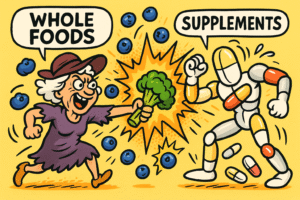 Whole foods do not present this risk. Their antioxidants are found in natural ratios alongside fiber, water, and other co-factors that regulate absorption and maintain balance. This approach prevents overdoses and supports consistent, long-term protection. Moreover, many supplements degrade over time due to exposure to heat, air, or light, diminishing their potency even before consumption. Whole foods are fresher and more stable, delivering antioxidants in their most effective forms, ensuring maximal health benefits.
Whole foods do not present this risk. Their antioxidants are found in natural ratios alongside fiber, water, and other co-factors that regulate absorption and maintain balance. This approach prevents overdoses and supports consistent, long-term protection. Moreover, many supplements degrade over time due to exposure to heat, air, or light, diminishing their potency even before consumption. Whole foods are fresher and more stable, delivering antioxidants in their most effective forms, ensuring maximal health benefits.
Studies reveal that individuals who incorporate antioxidant-rich whole foods into their diets experience lower rates of heart disease, cancer, and cognitive decline. This protective effect arises not from a single magic nutrient but from a rich tapestry of natural combinations. The antioxidant capacity of genuine, unprocessed food is unparalleled when it comes to fostering lasting health and cellular protection.
The Unique Advantages of Phytochemicals and Bioactive Compounds Found in Whole Foods
Phytonutrients are natural compounds found in plant foods that extend beyond basic nutrition, offering profound functional health benefits. These include flavonoids, lignans, carotenoids, glucosinolates, and stilbenes, each of which plays specific roles in cellular repair, inflammation control, and immune defense.
Unlike isolated nutrients in supplements, the phytonutrients present in whole foods work synergistically with other compounds. They assist your body in combating oxidative stress, regulating gene expression, and maintaining hormonal balance. For instance, sulforaphane found in broccoli activates detoxification enzymes that help eliminate harmful substances from the body, showcasing the incredible potential of whole foods.
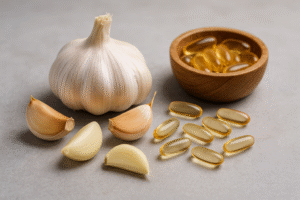 Garlic contains allicin, a powerful antimicrobial that enhances immune response. Onions provide quercetin, which helps alleviate allergic reactions and lowers blood pressure. Berries contain ellagic acid, which supports DNA repair and has been shown to slow tumor growth in laboratory studies. These examples highlight the diversity and potency of phytonutrients found in whole foods.
Garlic contains allicin, a powerful antimicrobial that enhances immune response. Onions provide quercetin, which helps alleviate allergic reactions and lowers blood pressure. Berries contain ellagic acid, which supports DNA repair and has been shown to slow tumor growth in laboratory studies. These examples highlight the diversity and potency of phytonutrients found in whole foods.
Mushrooms also offer immune-boosting compounds, such as beta-glucans, which help modulate immune activity. Crucially, these compounds often function optimally within their original food matrix—something that supplements cannot replicate or provide.
Many phytonutrients are delicate and can degrade quickly when isolated, processed, or improperly stored. Whole foods protect them within their natural structure, ensuring they reach your body in their most beneficial forms, maximizing therapeutic potential.
Embrace the Rainbow: Unlocking the Full Spectrum of Phytonutrient Benefits Through Diverse Eating
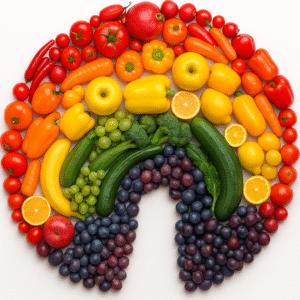 One of the simplest and most effective ways to harness the benefits of phytonutrients is to “eat the rainbow.” Different colors in plant foods signify different phytonutrient profiles. Red foods like tomatoes and watermelon are abundant in lycopene, which supports heart and prostate health. Orange and yellow foods such as carrots and peppers are rich in carotenoids that enhance eye health and immune function.
One of the simplest and most effective ways to harness the benefits of phytonutrients is to “eat the rainbow.” Different colors in plant foods signify different phytonutrient profiles. Red foods like tomatoes and watermelon are abundant in lycopene, which supports heart and prostate health. Orange and yellow foods such as carrots and peppers are rich in carotenoids that enhance eye health and immune function.
Green vegetables, like spinach and kale, are packed with lutein and chlorophyll, which promote cellular detoxification and brain health. Blue and purple foods—such as blueberries, grapes, and eggplants—contain anthocyanins that enhance circulation and reduce inflammation. Even white and brown plant foods, like garlic, onions, and mushrooms, provide powerful compounds that support immune health and cardiovascular function.
No supplement can rival the breadth and synergy of phytonutrients found in a colorful plate full of vegetables, whole grains, nuts, seeds, and herbs. By incorporating a wide range of whole plant foods into your diet, you open the door to a natural pharmacy of protection and support for your entire system, fostering optimal health.
Whole Foods: A Fundamental Source of Immune Support
Your immune system relies on a diverse array of nutrients working in harmony. Whole foods provide these essential nutrients along with supporting compounds. A varied diet rich in vegetables, fruits, grains, legumes, herbs, and spices equips your body to fend off illness and recover swiftly.
Whole foods deliver continuous immune-supporting nutrients such as vitamin C, D, zinc, selenium, and iron. These nutrients work most effectively when delivered alongside natural enzymes, fiber, and co-factors that enhance their absorption and overall effectiveness. Citrus fruits, leafy greens, pumpkin seeds, lentils, garlic, and ginger are all excellent options that bolster immune health.
Many of these immune-boosting compounds—like allicin in garlic, gingerol in ginger, and quercetin in onions—are either absent in supplements or degraded during processing. Whole foods preserve these compounds, delivering them in forms that your body readily recognizes and utilizes efficiently, maximizing their health benefits.
Furthermore, whole foods contribute to immune resilience by nurturing gut health, which houses a significant portion of your immune system. A fiber-rich diet nourishes beneficial bacteria, fortifies the gut lining, and mitigates inflammation, thereby enhancing overall immunity.
Research consistently links whole-food diets to stronger immune responses, quicker wound healing, and fewer infections. Individuals who consume diets high in fresh produce and whole grains experience fewer illnesses and recover more rapidly. These benefits reflect the intricate array of nutrients and plant compounds that synthetic supplements struggle to match.
By prioritizing whole foods, you are preventing deficiencies and actively fortifying your body’s first line of defense. This approach represents one of the simplest and most powerful strategies for supporting lifelong health without relying solely on pills and medications.
The Environmental Benefits of Choosing Whole Foods for Sustainability
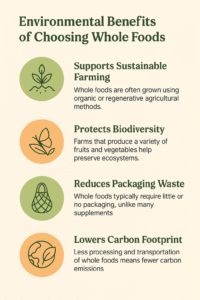 Whole foods are often cultivated using more sustainable practices. They support local agriculture, minimize pesticide use, and protect biodiversity. Choosing whole foods, particularly local and seasonal produce, benefits healthier farming methods and contributes to a cleaner environment.
Whole foods are often cultivated using more sustainable practices. They support local agriculture, minimize pesticide use, and protect biodiversity. Choosing whole foods, particularly local and seasonal produce, benefits healthier farming methods and contributes to a cleaner environment.
For instance, buying carrots or apples from a local farmer’s market typically means reduced food miles, less packaging waste, and a lower carbon footprint. Seasonal produce thrives naturally without the need for artificial lighting, heated greenhouses, or chemical ripening agents, which helps conserve energy and water, thereby promoting sustainability.
Many whole foods are produced via organic or regenerative farming methods. These techniques focus on restoring soil health, utilizing natural pest control, and safeguarding water systems. They contribute to reduced pollution and promote the long-term sustainability of our food systems, ensuring a healthier planet for future generations.
Whole foods also play a role in preserving biodiversity. Farms that cultivate a variety of fruits and vegetables support ecosystems and wildlife. In contrast, supplements often depend on monoculture farming—repeatedly growing the same crop—which depletes soil health and threatens ecological balance.
Another advantage is reduced packaging waste. Whole foods typically require little to no packaging when purchased loose or in bulk. You can store them in reusable containers or bags, eliminating the need for plastic tubs, blister packs, and foil wrappers that often accompany supplements, thereby minimizing environmental harm.
Conversely, the production of supplements usually involves global supply chains. Ingredients may travel thousands of miles and undergo extensive processing before being encapsulated and sealed. This extensive process contributes to greenhouse gas emissions, energy consumption, and plastic waste, underscoring the environmental impact of supplement production.
By choosing whole foods, you actively support a healthier planet. Each meal centered around fresh, seasonal produce promotes local farmers, protects the environment, and lessens your ecological footprint, making a positive impact on the world.
Promoting Sustainable Agriculture and Biodiversity Through Whole Food Choices
When you opt for whole foods, you champion a healthier planet. The impact of this choice reverberates far beyond your dining experience, affecting the health of our ecosystems and communities.
Whole foods, particularly those sourced locally and seasonally, are frequently grown without synthetic fertilizers, excessive pesticide use, or genetically modified organisms. This approach minimizes the chemical burden on our environment, safeguarding pollinators, water supplies, and the long-term health of our soil.
Regenerative farming practices employed in some whole food production go even further. These farms utilize cover crops, crop rotation, composting, and managed grazing to enhance soil fertility and sequester carbon. Over time, they restore ecosystems rather than deplete them, contributing to a more sustainable food system.
Local food systems are crucial for reducing the emissions associated with long-distance food transportation. When you purchase a head of lettuce from a local farm instead of a prepackaged salad flown in from overseas, the difference in fuel consumption is significant and beneficial to the environment.
Buying from farmers’ markets or subscribing to a community-supported agriculture (CSA) box helps small-scale farmers remain viable. This practice keeps money circulating within local economies and protects food diversity, which industrial monoculture threatens, contributing to greater food security.
Even minor adjustments, such as opting for unpackaged apples over shrink-wrapped snack bars, can substantially reduce plastic waste and lessen landfill strain. These daily choices accumulate, contributing to a system that prioritizes sustainability, nutrition, and environmental stewardship.
When you construct your meals around whole foods, you’re not merely protecting your health; you’re investing in a food system that values people, animals, and the planet, fostering a more sustainable future for all.
Minimizing Packaging Waste and Pollution Through Whole Food Choices
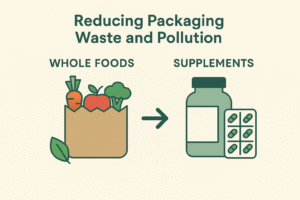 Whole foods generally come with minimal or compostable packaging. Purchasing loose produce, grains, and legumes helps prevent unnecessary plastic waste. You can store these items in reusable bags, jars, or containers, significantly cutting down on single-use materials that pollute our environment.
Whole foods generally come with minimal or compostable packaging. Purchasing loose produce, grains, and legumes helps prevent unnecessary plastic waste. You can store these items in reusable bags, jars, or containers, significantly cutting down on single-use materials that pollute our environment.
Buying in bulk also reduces the need for excessive packaging and transportation. This simple adjustment in shopping habits can lead to a considerable decrease in landfill contributions and the demand for virgin packaging materials, promoting a more sustainable lifestyle.
Supplements, however, are often packaged in plastic bottles, foil pouches, or blister packs—many of which are challenging or impossible to recycle. These packages are designed for durability and convenience rather than environmental friendliness, contributing to long-term waste problems.
Some supplement companies have begun transitioning to glass bottles or biodegradable containers to lessen their environmental impact, which is a positive development, though it’s not yet the standard practice. The majority of supplements remain packaged in petroleum-based plastics that can persist in landfills for centuries, exacerbating pollution.
Additionally, supplement packaging is only one part of the problem. Each capsule or tablet often contains ingredients sourced from multiple countries, necessitating extensive transportation, processing, and repackaging. This global supply chain adds a significant carbon and material footprint that is avoidable.
In contrast, whole foods, especially those sourced locally, require fewer resources and produce less waste. Replacing packaged supplements with fresh, unpackaged produce is one of the simplest ways to reduce your environmental impact. Choosing whole foods helps mitigate pollution from production to consumption at every stage, contributing to a healthier planet.
The Economic Advantages of Whole Foods Over Supplements
At first glance, whole foods may seem more expensive, but they often prove to be less costly over time. Investing in nourishing your body with real, nutrient-dense ingredients reduces your risk of illness, translating to fewer doctor visits, less time off work, and lower long-term healthcare costs.
Supplements can become an added financial burden, often used to compensate for a poor diet. If your meals lack essential nutrients, you might feel compelled to “top up” your intake with pills, powders, or capsules. However, this strategy rarely addresses the root causes and can evolve into an expensive short-term fix rather than a sustainable solution.
Conversely, a diet centered around whole foods naturally provides the nutrients your body craves—effectively, efficiently, and often at a lower cost. Instead of paying for food and then paying again for supplements, you can obtain everything you need in one package: your plate filled with wholesome, nourishing ingredients.
Shopping for whole foods doesn’t have to strain your budget. Visiting local markets, selecting seasonal produce, and purchasing grains and legumes in bulk can all help lower costs. Cooking at home with these wholesome ingredients is healthier and significantly more economical than relying on processed convenience foods or pre-prepared meals.
Moreover, maintaining good health through a balanced diet can yield financial savings in the long run by preventing chronic diseases such as diabetes, heart disease, and obesity. These conditions incur substantial management costs but are often preventable through consistent, wholesome nutrition, highlighting the economic benefits of whole foods.
Opting for whole foods is not only beneficial for your health but also a wise financial decision. You nourish your body, avoid unnecessary expenses on supplements, and reduce your risk of costly medical treatments in the future, creating a positive cycle of health and savings.
Realizing Long-Term Financial and Health Savings Through Whole Foods
Preventing chronic diseases through proper nutrition can lead to substantial savings, both financially and in terms of improved quality of life. Many common and costly health conditions, such as type 2 diabetes, high blood pressure, heart disease, and certain cancers, are significantly influenced by dietary choices.
Studies consistently demonstrate that diets rich in whole foods correlate with lower rates of chronic illnesses. This translates into reduced prescriptions, less reliance on medical interventions, and a decreased need for ongoing treatments or hospital visits, creating a healthier population.
The financial ramifications can be considerable. Chronic conditions often necessitate long-term medications, routine blood tests, regular specialist visits, and time off work due to illness. These costs can accumulate rapidly, imposing a significant burden on both individuals and healthcare systems.
By prioritizing prevention through a nutrient-dense, whole-food diet, many of these adverse outcomes can be avoided or delayed. Eating healthily daily is akin to making small, consistent deposits into your personal health savings account. The more you invest in your health now, the greater your return later, measured in energy, mobility, independence, and peace of mind.
There’s also an emotional component. Preventing avoidable illnesses can spare you and your loved ones from stress, anxiety, and caregiving burdens. Good nutrition supports a better quality of life, allowing you the energy to engage in activities you cherish and the resilience to navigate life’s challenges.
In summary, whole foods not only nourish your body today—they invest in your future. They represent a commitment to lifelong health that yields dividends in fewer sick days, lower medical bills, and enhanced freedom as you age, ultimately resulting in a happier, healthier life.
Ensuring Access and Affordability of Whole Foods for Everyone
Whole foods such as fresh produce, grains, and legumes are widely available in supermarkets, farmers’ markets, and corner shops. They often cost less per serving than processed meals or supplements while providing far greater nutritional value, making them a smart choice for any budget.
Staples like oats, brown rice, lentils, carrots, and cabbage are affordable, filling, and nutrient-dense. These foods are shelf-stable, can be purchased in bulk, and serve as the foundation for countless healthy, budget-friendly meals.
Local farmers’ markets and community-supported agriculture (CSA) programs enhance the accessibility of healthy eating. These sources provide seasonal produce at fair prices while supporting local growers and minimizing the environmental costs linked to long-distance transportation.
Many communities also host food co-ops or discount produce boxes that facilitate the purchase of healthy foods without financial strain. Even frozen fruits and vegetables, which retain most nutrients, can be a cost-effective, convenient alternative when fresh produce is unavailable, ensuring that everyone has access to nutritious foods.
In contrast, dietary supplements often come with a premium price tag. A single bottle may cost more than a week’s worth of fresh vegetables or grains. Given that supplements are typically taken daily, the costs can escalate quickly over time, making them less practical for many individuals.
There is also the risk of spending on unnecessary or poorly absorbed supplements that may offer little benefit. When your body receives the nutrients it requires from whole foods, there’s less uncertainty and greater reliability in terms of both health and budget.
Whole foods provide a superior return on investment. You are not only paying for calories; you are investing in fiber, antioxidants, enzymes, water, and synergistic nutrients that empower your body to thrive, fostering a culture of health and wellness.
Accessible, affordable, and profoundly nourishing, whole foods remain the most cost-effective and sustainable choice for long-term health, ensuring that everyone can benefit from nutritious eating.
Exploring the Social and Cultural Significance of Whole Foods
 Whole foods serve more than just nutritional purposes—they unite people and help preserve cultural identities. Across the globe, traditional diets centered around vegetables, grains, legumes, and fresh local ingredients play a pivotal role in daily life, family traditions, and community gatherings.
Whole foods serve more than just nutritional purposes—they unite people and help preserve cultural identities. Across the globe, traditional diets centered around vegetables, grains, legumes, and fresh local ingredients play a pivotal role in daily life, family traditions, and community gatherings.
In regions like Okinawa, Japan, residents enjoy some of the longest, healthiest lives on the planet. Their diet is rich in sweet potatoes, leafy greens, tofu, seaweed, and small fish. These meals are low in processed foods and sugars while being high in fiber, antioxidants, and plant-based nutrients. Supplements are rarely part of their daily regimen; instead, they rely on natural whole foods to foster vitality and longevity.
The Mediterranean diet exemplifies another powerful approach. Common in Greece, southern Italy, and parts of Spain, this diet emphasizes vegetables, legumes, olive oil, whole grains, nuts, herbs, and limited amounts of fish or dairy. Red meat and processed foods are kept to a minimum. People in these regions not only enjoy longer lives but also experience lower rates of heart disease, dementia, and metabolic disorders.
Importantly, these benefits stem not from pills or powders but from consistent habits rooted in fresh, flavorful meals crafted from simple, wholesome ingredients. Food is not rushed or consumed in isolation; it is shared with family and friends, savored slowly, and appreciated as a daily pleasure rather than just fuel—a practice that enhances social bonds.
These food cultures highlight seasonality, local produce, and mindful preparation. Cooking and eating become avenues for connection, gratitude, and joy. This dynamic fosters strong communities while supporting both mental and physical health. By adopting a more whole-food-focused lifestyle, we not only enhance our plates but also revive powerful traditions of health, celebration, and human connection that modern convenience often overshadows.
Nurturing Family and Community Bonds Through Shared Meals
Whole foods do more than sustain the body—they nourish relationships. Preparing and sharing meals made from fresh ingredients is a potent means of strengthening bonds, enhancing emotional well-being, and passing down culinary traditions. Families that eat together are more likely to make healthier food choices, communicate openly, and develop lifelong habits that promote well-being.
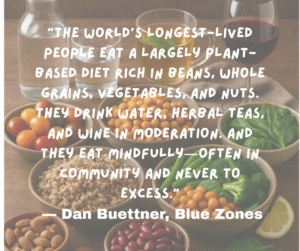 This connection between food and community is a hallmark of the world’s Blue Zones, regions where people lead the longest, healthiest lives. In places like Okinawa, Japan, Ikaria, and Greece, meals are seldom consumed alone or in haste. Instead, families and friends gather daily to share simple, home-cooked meals, often made from garden-fresh vegetables, beans, herbs, and whole grains.
This connection between food and community is a hallmark of the world’s Blue Zones, regions where people lead the longest, healthiest lives. In places like Okinawa, Japan, Ikaria, and Greece, meals are seldom consumed alone or in haste. Instead, families and friends gather daily to share simple, home-cooked meals, often made from garden-fresh vegetables, beans, herbs, and whole grains.
Eating together creates opportunities for meaningful conversation, laughter, and relaxation. These moments alleviate stress, enhance digestion, and foster a strong sense of belonging. Research indicates that regular family meals correlate with improved academic performance in children, lower rates of depression, and heightened emotional resilience across all ages.
Whole foods are central to these shared meals. They are colorful, aromatic, and satisfying, encouraging slower, more mindful eating. In contrast, convenience foods and supplements often promote isolation—a quick bar consumed in the car, a shake gulped down at your desk, or a multivitamin taken without a second thought.
No supplement can replicate the joy of preparing a meal with loved ones, the comfort of sharing a meal, or the cultural traditions surrounding food. While a pill may deliver nutrients, it can never replace the human experience of gathering around a table. When we choose whole foods, we also choose a connection that deeply enriches both physical and emotional well-being.
Enhancing Culinary Diversity and Joy Through Whole Foods
Whole foods not only support your physical health; they also delight the senses. With their vibrant colors, bold textures, and diverse flavors, they inspire creativity in the kitchen, transforming eating into an exciting experience rather than a restrictive chore. Unlike bland powders or pills, whole foods make meals something to anticipate and enjoy.
This diversity is not just enjoyable; it’s powerful. Each color in plant-based foods signals different phytonutrients, antioxidants, and health advantages. Red foods like tomatoes and red peppers are high in lycopene. Orange foods such as carrots and sweet potatoes provide beta-carotene. Leafy greens offer chlorophyll and magnesium. Blueberries and eggplants contain anthocyanins that protect both the brain and heart.
Consuming a wide array of colors means providing your body with a spectrum of nutrients that work together to bolster immunity, gut health, heart health, and more. A colorful plate typically reflects a more complete nutrient profile compared to one dominated by beige or processed foods, fostering overall health.
Join the “Eat the Rainbow Challenge” to Boost Your Nutrient Intake
To make it fun, consider trying the “Eat the Rainbow Challenge.” This involves aiming to consume twenty-five to thirty different plant foods in one week. These could include various fruits, vegetables, legumes, whole grains, herbs, or nuts. Each item counts once, and it’s more achievable than you may think! Simply adding a few new ingredients to your regular meals can quickly increase variety.
Alternatively, try the “Color-of-the-Day” approach:
- Monday – Red (tomatoes, strawberries, red lentils)
- Tuesday – Orange/Yellow (carrots, squash, mango)
- Wednesday – Green (spinach, broccoli, peas)
- Thursday – Purple/Blue (eggplant, blueberries, purple cabbage)
- Friday – White/Brown (garlic, mushrooms, oats)
- Weekend – Mix it all together!
These challenges promote variety and transform eating into a more intentional and enjoyable experience. Involving children, friends, or housemates adds a social element, reinforcing positive habits through shared experiences.
When meals are colorful, interesting, and flavorful, you’re more likely to savor them and maintain healthy eating for the long term. Whole foods naturally bring that joy without additives, flavorings, or synthetic enhancements, reminding us that eating well should be a source of pleasure.
Eating well shouldn’t feel like a punishment; it should feel like a source of joy, exploration, and endless possibilities. With whole foods, it absolutely can.
The Psychological Benefits of Whole Foods in Enhancing Mental Well-being
Whole foods contribute not only to physical health but also to mental and emotional well-being. Their natural colors, textures, and aromas encourage mindful eating and foster a sense of true nourishment. Sitting down to an authentic meal made with fresh, vibrant ingredients engages your senses and creates a deeper connection to the act of eating, enhancing overall satisfaction.
 Conversely, swallowing a pill or consuming a meal replacement shake may deliver some nutrients, but it lacks the experience of eating. There’s no chewing, aroma, texture, or satisfaction involved. This can leave you feeling mentally unfulfilled and physically undernourished, even if your body technically received calories.
Conversely, swallowing a pill or consuming a meal replacement shake may deliver some nutrients, but it lacks the experience of eating. There’s no chewing, aroma, texture, or satisfaction involved. This can leave you feeling mentally unfulfilled and physically undernourished, even if your body technically received calories.
Chewing plays a crucial role in signaling satiety. The act of chewing sends a message to your brain, indicating that you are eating. This initiates a cascade of physiological responses: your stomach begins preparing for digestion, and your brain releases hormones that promote feelings of fullness. Chewing crunchy vegetables, hearty grains, or juicy fruits is vital for signaling satiety and preventing overeating.
Understanding Why Chewing and Real Meals Matter More Than You Think
Chewing also activates the digestive system. As you chew, your body produces digestive enzymes in the mouth, stomach, and small intestine. These enzymes are crucial for properly breaking down food, allowing your body to absorb nutrients effectively. Bypassing this step by drinking or swallowing your nutrition overlooks a critical phase of digestion, which may result in bloating, hunger, or dissatisfaction.
Whole foods also encourage slower eating. When you prepare and consume real meals, you are more likely to take your time, savor your food, and recognize when you are full. This promotes healthy weight management without strict rules or restrictive diets, fostering a positive relationship with food.
Individuals who predominantly eat whole foods report fewer cravings and less emotional eating. This is because whole foods create a physical and psychological sense of satisfaction. You feel nourished and content. Over time, this fosters a healthier, more positive relationship with food, encouraging mindful eating habits.
Eating well encompasses not just what you consume but also how you experience it. Whole foods restore the pleasure, presence, and satisfaction that authentic eating is meant to provide, transforming mealtime into a cherished ritual.
Establishing Positive Habits and Mindsets Through Whole Foods
Choosing whole foods leads to healthier eating patterns that are easier to sustain over time. These habits form the foundation for both physical and mental well-being. When you nourish your body with real, wholesome ingredients, you naturally feel more energized, focused, and balanced—facilitating adherence to healthy choices without relying solely on willpower or discipline.
Whole foods help eliminate the cycle of extremes often associated with ultra-processed foods or fad diets, which include cravings, restriction, and bingeing. Because whole foods are nutrient-dense and satisfying, they promote stable blood sugar levels, sustained energy, and fewer cravings, making consistent healthy eating much more attainable and enjoyable.
You are also more likely to continue healthy behaviors when they feel enjoyable and fulfilling. Whole foods make this possible by being both deeply nourishing and genuinely delicious. Crisp apples, roasted sweet potatoes, and a vibrant salad adorned with fresh herbs offer comfort and joy, not just nutrition, enriching your overall experience.
Over time, choosing whole foods becomes second nature. Healthy meals cease to feel like a chore or a temporary plan. Instead, they evolve into a lifestyle rooted in enjoyment, not restriction, creating a sustainable approach to health.
This sense of pleasure and sustainability is what makes whole foods so impactful. Eating well feels good and tastes good, increasing the likelihood of maintaining those habits for the long haul, enhancing both your physical and mental well-being.
Building Trust in Your Food Choices with Whole Foods
Trust plays a vital role in what we choose to consume. With whole foods, that trust is well-founded. You know exactly what you’re eating when you select fresh, unprocessed fruits, vegetables, legumes, whole grains, nuts, and seeds. There are no hidden ingredients, additives, or synthetic compounds—just real, recognizable food that nourishes your body.
Supplements, however, can often be less transparent. Many contain unnecessary fillers, artificial colors, binders, or preservatives. Some are contaminated with heavy metals or unlisted ingredients, while others may not provide the amount of active nutrients claimed on the label. These inconsistencies can make it challenging to know what you are truly consuming and how it may impact your health negatively.
Even when supplements undergo third-party testing, they lack the natural complexity and balance inherent in whole foods. Moreover, unlike food, supplements are not always strictly regulated for safety or quality, particularly in global markets with looser oversight, raising concerns about their reliability.
Whole Foods vs. Processed Foods: Understanding the Clear Distinction
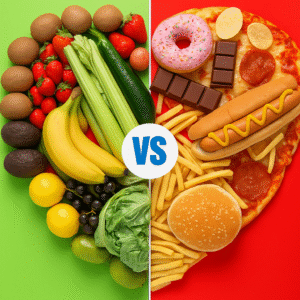 It’s crucial to clearly differentiate between whole foods and processed foods. Just because a product is plant-based or labeled as “natural” does not guarantee its healthfulness. Highly processed plant products, such as flavored veggie chips, sugary granola bars, or instant noodle cups, are stripped of their original nutrients and loaded with salt, sugar, and unhealthy oils that can negatively affect health.
It’s crucial to clearly differentiate between whole foods and processed foods. Just because a product is plant-based or labeled as “natural” does not guarantee its healthfulness. Highly processed plant products, such as flavored veggie chips, sugary granola bars, or instant noodle cups, are stripped of their original nutrients and loaded with salt, sugar, and unhealthy oils that can negatively affect health.
Whole foods, however, are distinct. They are close to their original form, minimally processed, and full of natural nutrition. A baked potato, a bowl of lentil soup, or a fresh apple provides safe, reliable nourishment that your body understands and can utilize effectively.
With whole foods, there is no need to scrutinize ingredient lists or question what’s inside. You can trust them because they are genuine. They are grown in soil, harvested at maturity, and prepared in your kitchen, not manufactured in a factory or concealed in a capsule. When your food comes directly from nature, you can consume it confidently, knowing it is beneficial. That peace of mind is something no supplement or synthetic product can offer.
Embracing Whole Foods for a Healthier Tomorrow
Whole foods provide far more than mere calories or isolated nutrients—they offer the essential building blocks for a vibrant, resilient life. From their remarkable nutritional synergy to their ability to prevent disease, promote mental health, and strengthen communities, they are foundational to true wellness.
They also honor the planet. Choosing whole, unprocessed foods results in less packaging, reduced emissions, and more sustainable farming practices. This approach nourishes not only your body but also the soil, water, and ecosystems on which we all depend, fostering a healthier environment for future generations.
This mindset transcends diet; it’s about reclaiming your health, trusting in real food, and reconnecting with the joy of eating well. Each colorful, home-cooked meal becomes an act of self-respect and a quiet commitment to future well-being.
In choosing whole foods, you prioritize simplicity, nourishment, and integrity. You say yes to lifelong energy, clearer thinking, stronger immunity, and a fulfilling life that emanates from within, paving the way for a healthier future.
Your plate is your power. Use it wisely.
Frequently Asked Questions About Whole Foods and Their Benefits
What makes whole foods a superior choice compared to supplements?
Whole foods deliver a complex array of nutrients, encompassing vitamins, minerals, and antioxidants in their natural forms. In contrast, supplements often contain isolated nutrients that may not be as readily absorbed by the body, diminishing their overall effectiveness and health benefits.
How do whole foods promote better digestive health?
Whole foods are high in dietary fiber, which promotes healthy digestion, prevents constipation, and supports a balanced gut microbiome, all contributing to overall digestive health and well-being.
What are phytochemicals, and why are they significant?
Phytonutrients are bioactive compounds in plants that provide various health benefits, including anti-inflammatory properties and a reduced risk of chronic diseases. These benefits cannot be replicated by supplements, making whole foods essential for optimal health and wellness.
In what ways do whole foods contribute to environmental sustainability?
Whole foods typically require less processing and packaging, resulting in a lower carbon footprint and less waste. They also support local food systems, making them a more sustainable choice than supplements, which often rely on global supply chains.
Are whole foods more budget-friendly than supplements?
Yes, whole foods can be more cost-effective in the long run, as they often provide essential nutrients at a lower price than the ongoing costs of regularly purchasing supplements, making them accessible for everyone.
How do whole foods relate to cultural traditions?
Whole foods are integral to many cultural dietary practices and celebrations, fostering community connections and preserving culinary heritage while encouraging healthier eating habits and lifestyles.
How can whole foods enhance mental health?
Whole foods promote feelings of satiety and satisfaction, which can reduce emotional eating and support mindful eating practices, ultimately enhancing overall mental well-being and emotional health.
Why is it important to consider the safety of whole foods?
Whole foods are less likely to cause adverse reactions than synthetic supplements, which may contain artificial additives and preservatives, making them safer for nutrition and dietary choices.
How do whole foods support immune function?
Whole foods are rich in bioactive compounds, vitamins, and minerals that bolster immune health, equipping the body to defend against infections and diseases effectively, promoting overall wellness.
What are the long-term advantages of choosing whole foods?
Consistent consumption of whole foods is associated with improved health outcomes, reduced risk of chronic diseases, and long-term healthcare savings, making them a wise investment for overall health and well-being.
Connect with us on Facebook!
The Article: The Nutritional Advantages of Whole Foods versus Supplements appeared first on https://janestevensnutrition.com
The Article Whole Foods vs. Supplements: Discover Nutritional Benefits Was Found On https://limitsofstrategy.com

